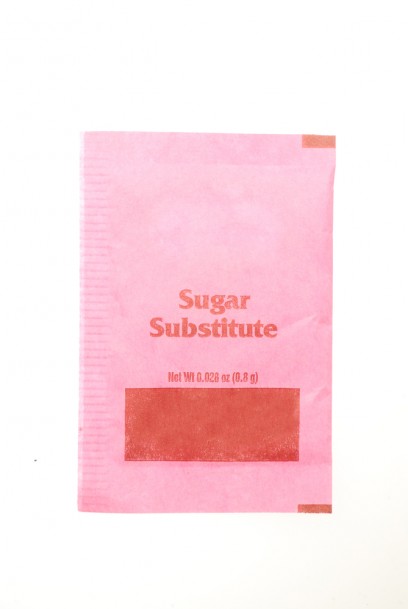November 4, 2014
New ebook features poorly written product placement
by Nick Davies

Sweet’N Low has invested millions in ebook product placement.
©Karin Hildebrand Lau / via Shutterstock
Apparently frustrated by the rise in recent years of Splenda and the prominent role that Stevia played in the final season of Breaking Bad, artificial sweetener Sweet’N Low has found a way to get in on the product placement game, through a new platform that includes placement in ebooks.
Alexandra Alter writes for the New York Times this week about a multimedia company that’s taking an approach to promotion that, depending on your perspective, is either innovative or scarily cynical in its approach. Storyverse Studios, founded by Hillary Carlip and Maxine Lapiduss, an entertainment company with a team of writers and social media experts who have created a series of websites and online video content that tie into the company’s first project: an ebook whose primary purpose seems to be to drive readers to advertising on various platforms.
The book, Find Me I’m Yours, is written by Carlip and features Sweet’N Low prominently, thanks to $1.3 million invested in the project by the Cumberland Packing Corporation, the Brooklyn company that makes the sweetener. In a move that Alter generously describes as “blur[ring] the lines between art and commerce,” it features sparkling dialogue that also dispels myths about the dangers of Sweet’N Low. To wit: “They fed lab rats twenty-five hundred packets of Sweet’N Low a day … And still the F.D.A. or E.P.A., or whatevs agency, couldn’t connect the dots from any kind of cancer in humans to my party in a packet.”
If the phrases “whatevs agency” and “party in a packet” aren’t enough to turn your stomach, Alter also explains that Find Me I’m Yours was “conceived as click bait from the start,” adding that Carlip “set out to write an interactive multimedia narrative packed original videos and with links to websites that enhanced the story.” She created 33 websites that feature content directly related to the book, like Bridalville, a bridal humor site where the main character works. These sites establish a larger world around the novel, and allow readers to enjoy an interactive experience, but their goal is to provide space for sponsored content; for example, as Alter writes, “a pet food company might sponsor an animated series on Freak4mypet.” Yes, thanks to this book, a website called Freak4mypet now exists, complete with categories like “Pets in Wigs” and “Pets on the Go.”
The upside to all this is that audiences have learned to be wary of product placement in movies and television; and if all of it is as blatant as the Sweet’N Low discussion quoted by in the Times story, it’s hard to believe people will be taken in by it. Still, it’s a sign that, just as Futurama predicted, advertising is only going to get more and more insidious as time goes on.
Nick Davies is a publicist at Melville House.